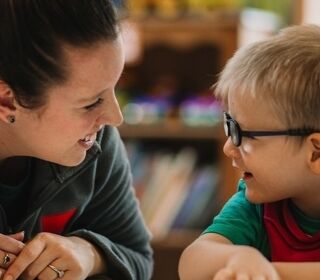
Blog

When you learn to look at the world from a child-centred point of view, it quickly becomes clear how much impact we can have both on children as children and children as they develop into adults.
Learning about childhood helps us to recognise that children are different to adults; they’re not mini-adults, or adults-in-waiting, they are valid in their own right. Children are vulnerable and need specific support to help them develop. Understanding this can help us to find ways to give voice and agency to some of the most vulnerable and under-represented children in society. Studying childhood can allow you to be an agent for change and make a positive, lasting impact.
Let them lead conversations
We offer courses in this arena – Early Childhood Studies, Working with Children, Young People and Families, and Education Studies – which allow you opens up a host of roles within the field of education, social care and family support. Through these you will be able to recognise the impact that families and society overall has on children and their development. To develop motor skills, verbal skills and confidence it’s important to know that you must listen as well as to talk to the child. Let them lead conversations, give them eye contact and time. If you watch TV, online or otherwise, talk about it together, during and afterwards, so that it’s an active, shared experienced. It’s only through the study of childhood that you learn how important these things are and are able to use and advise on strategies like these yourself.
Children are naturally curious
Childhood studies tells us that children are naturally curious and you will learn how to promote and stimulate that curiosity, as well as provide the right environment for them to thrive. Children learn by being active, being curious, interacting socially and finding things out, investigating – and this is what play is. Play is the best vehicle for children to learn, to explore the world and to find out. You will begin to understand that children flourish when exploring the world from a secure base; that means with someone they have a strong emotional attachment with, with whom they learn to be confident and develop resilience. Children who have secure emotional attachments with key people – initially parents, grandparents – already have a level of confidence that means they can explore the world. As a graduate in the area of childhood studies you will have a good understanding of how this strong foundation supports the development of resilience that children need, for example starting school, moving through education, making friends and dealing with disappointments – and that we need as adults too in order to feel good about ourselves and to deal with the challenges that the world brings to us. It is through childhood studies that we know this emotional wellbeing is far more important than formal learning, and has lasting impact into adulthood.

A combination of nature and nurture
Childhood studies also helps us to understand how children all develop at different rates. It's a combination of nature and nurture. Research into how children develop and learn shows us that learning is a social activity. When more experienced people, such as other children or adults, who know and understand the world more than a young child, are actively involved i.e. playing with the young child, she/he will learn more. For example, a child will always benefit from an adult sharing a book with them to talk more about the pictures and story then they would by themselves. Similarly a parent playing with Lego asking questions about the child will be doing next and actively engaging with the child's play will promote further thinking and understanding. It's also good fun and strengthens relationships! Understanding this can allow you to employ strategies to help children to continue to develop.
Intervention
This understanding can also help us to intervene if a child gets behind developmentally, helping them to catch up and minimise impact on their later childhood and adulthood. All children are ready to learn but sometimes it's about not whether they are learning but what, and importantly how. Childhood studies shows how important it is for teachers in schools, family and any specialist services needed to all work together to ensure the child makes a good transitions to school and that appropriate learning experiences appropriate are developed for that individual child to help their development. The study of childhood can help us pick up developmental problems more quickly – and if they are picked up quickly – can help us devise the right sort of early intervention so that children can and do catch up.
So if you want to make a difference and agree that children are important, then a degree in an area of childhood studies could be the next step for you. If will influence the way you look at the world both professionally and may be even as a parent yourself now or in the future! It offers a huge range of possibilities for future careers, not just working directly with children and their families, but also in leadership and management in terms of measuring impact, and evaluating services and interventions. Childhood studies will give you the ability to recognise quality interventions and influence policy if that’s where your interest lies.
Childhood, Youth and Community at BCU
Take a look at our course pages to find out how you could make a difference.